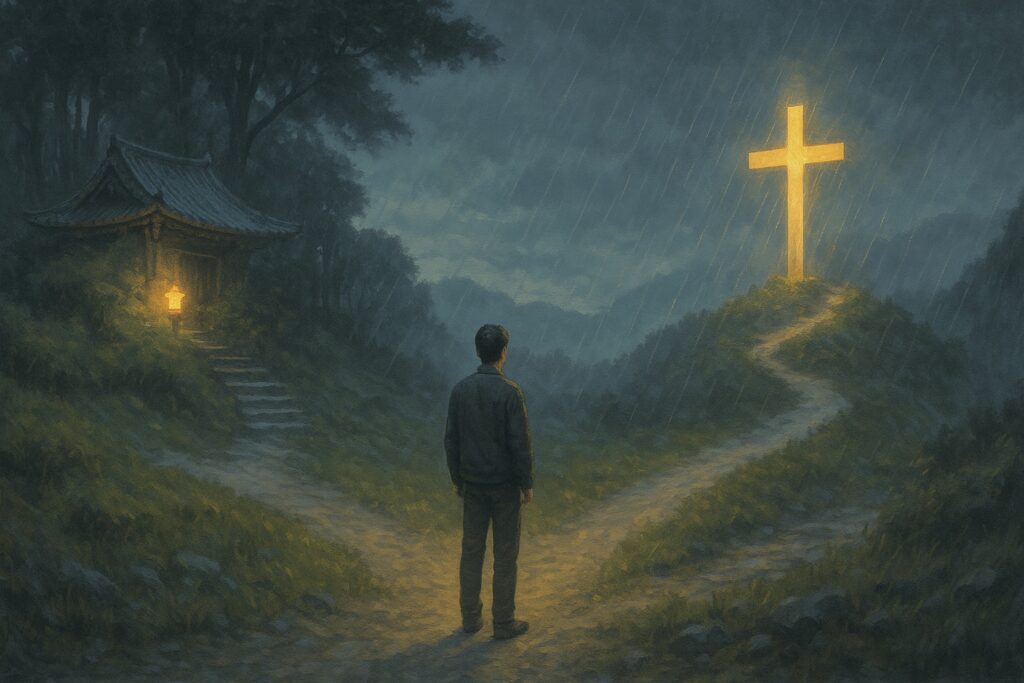——从文化顺从到真理抗争
文/HuSir
在现实的大洋国,信仰的沉默已成为一种集体生存方式。表面上,这种沉默似乎出于谨慎,实则是一种文化与制度交织下的精神自保。大洋国的人普遍更容易接受佛教,而难以真正活出基督信仰,其根源不只是政治压制,也在于文化深处那种顺从与避祸的哲学传统。这种传统让人习惯于保持中庸与安稳,甚至在信仰生活中也不例外。
大洋国的信徒之所以倾向沉默,是因为这种沉默看似安全,也看似智慧,符合大洋国这个人情化社会的‘国情’和‘民情’。无论是三自教会还是家庭聚会点,人们往往将“不谈政治”“不触现实”“只谈属灵”视为成熟表现。讲台上避免触及社会问题,对圣经及其真理停留在理论范围,祷告中避谈公义与罪,缺少批判性思维的信仰追求。久而久之,信仰成了一种心灵的安慰,而非真理的力量。信徒害怕的不是罪,而是风险;追求的不是真理,而是平安。政治的压制与文化的顺从在这里彼此呼应:政权需要这样的顺民,而宗教则提供顺从的方式,并将这种顺从美化为信仰的力量,却忽视了与神同行的主动性和神圣性。

事实上,佛教能在大洋国延续千年,正是因为它与这种文化气质天然契合。佛教讲“忍”“舍”“空”,提供了一种在现实不公中自我平衡的路径。它不要求改变社会结构,也不要求面对真相,而是引导人“看破”“放下”“随缘”,从而在痛苦中找到内心的安宁。这种精神恰好满足了大洋国的人几千年来的心理结构——在无法改变的世界中求自我调和,在权力强势的现实里求内心退让。佛教的柔性、静默与安分,使它成为最适合被统治者的精神寄托。再搭配上当政者两千多年来推崇儒家思想,顺民的形象便在历朝历代延续下来,同时也被当下的大洋国统治者所推崇并升华,例子不胜枚举。
而真正的基督信仰恰恰相反。它要求人面对真理,面对罪,面对十字架。它宣告人的自由来自上帝而非权力,要求人悔改而非妥协。这样的信仰乃至伴随其左右的批判性思维无法与大洋国传统文化的“和为贵”逻辑兼容。真正的基督信仰呼召人脱离人治体系,承认真理高于权力——而这正是大洋国文化长期拒绝的部分。大洋国的人敬重基督的慈爱,却惧怕基督的锋芒;欣赏耶稣的温柔,却逃避十字架的代价。因为真正的悔改意味着对现实的不顺从,对虚伪秩序的挑战,对自我惧怕的瓦解。
在这样的文化环境中,“沉默”也成为众多大洋国基督徒信仰生活中最体面的表达方式。信徒把谨慎当作智慧,把顺从当作敬虔;牧者强调和平与稳定,却很少教导信徒如何为义受逼迫。于是信仰渐渐失去了盐的味道,教会成为社会秩序的附庸。人们聚会、祷告、读经,却不让真理进入生活;信仰停留在形式中,却失去了改变人心的力量。
真正的基督信仰并不迎合文化,而是穿透文化。它不是要让人“在黑暗中平静地活”,而是教人“在黑暗中成为光”。佛教让人接受命运,基督信仰让人面对命运;前者教人忘记苦难,后者呼召人直视罪恶。佛教的智慧在于消融,而基督的真理在于更新。
佛教确实更容易被大洋国的人接受,因为它顺应了文化的惯性。而基督信仰之所以艰难,是因为它揭穿了这种惯性——它不让人继续活在“明哲保身”的幻觉中,而要求人以真理为生命中心。一个人若只追求内心平静而不追求真理,他得到的只是温顺的安慰;而若敢让真理进入自己的现实,他才能真正得自由。
大洋国的信徒若不打破这种文化性沉默,不让真理介入现实、挑战虚伪、医治惧怕,那么无论读多少经文、聚多少会,终究只是延续一种被宗教包装的顺从。真正的信仰不会让人变得安全,而是让人变得真实。它不是教人逃避痛苦,而是让人经历重生。佛教的“空”能让人短暂安息,基督的“道”却能让人真正复活。
因此,大洋国的问题不在于佛教的流行,而在于人心对真理的抗拒。一个民族若总是在寻找可以“安静地信”的宗教,它就永远无法面对自己的罪。真正的自由,不是脱离外在约束,而是脱离内在惧怕。当大洋国的人敢在信仰中承担十字架,而不是继续守着沉默的智慧,那时,福音才会在这片土地上真正落地生根。
Why the People of Oceania Are More Drawn to Buddhism Than to Christianity
— From Cultural Submission to the Struggle for Truth
By HuSir
In today’s Oceania, religious silence has become a collective way of survival. On the surface, such silence appears to be prudence, yet in essence it is a form of spiritual self-preservation born of the fusion between culture and political control. People in Oceania tend to embrace Buddhism far more easily than to truly live out the Christian faith. The reason lies not only in political suppression, but also in a deep-rooted philosophical tradition of conformity and avoidance. This tradition has conditioned people to prefer balance and stability, even within their spiritual lives.
Believers in Oceania have grown accustomed to silence because it seems both safe and wise—it fits perfectly with the nation’s “social temperament” and “cultural character.” In both state-sanctioned churches and private gatherings, people often regard “not talking about politics,” “not engaging reality,” and “focusing only on the spiritual” as signs of maturity. From pulpits that avoid social issues to prayers that steer clear of justice and sin, faith is stripped of critical reflection. Over time, Christianity has been reduced to emotional comfort rather than the power of truth. People no longer fear sin; they fear risk. They no longer seek truth; they seek peace. Political repression and cultural compliance reinforce one another: the regime needs docile citizens, and religion offers the language of submission—beautifying obedience as spiritual strength while neglecting the sacred initiative of walking with God.
Buddhism, by contrast, has endured for millennia in Oceania precisely because it naturally aligns with this cultural disposition. It teaches endurance, detachment, and emptiness—offering a path to internal balance amid injustice. Buddhism demands neither social change nor confrontation with reality. Instead, it teaches people to “see through,” “let go,” and “follow destiny,” helping them find peace within suffering. This mindset perfectly matches the psyche of Oceania: seeking self-reconciliation in an unchangeable world and inner retreat under external domination. Its softness, quietness, and restraint make Buddhism the ideal spiritual refuge for the governed. Combined with the ruling powers’ two-thousand-year admiration of Confucian ideals, the image of the obedient subject has been preserved throughout the ages—and continues to be praised, even exalted, by the current rulers of Oceania.
True Christianity, however, stands in complete opposition to this. It calls people to face truth, to face sin, and to face the cross. It proclaims that freedom comes from God, not from power, and it demands repentance rather than compromise. This faith, along with the critical thinking it inspires, clashes head-on with the traditional “harmony above all” logic of Oceania’s culture. Genuine Christian faith calls people out of human-centered authority and into the recognition that truth is higher than power—something Oceania’s culture has long resisted. Its people admire Christ’s compassion but fear His sharpness; they love His gentleness but evade the cost of His cross. For true repentance means noncompliance with falsehood, confrontation with hypocrisy, and the breaking of fear itself.
Within such a culture, silence becomes the most respectable form of religious expression. Believers mistake caution for wisdom and obedience for piety. Pastors preach peace and stability but rarely teach what it means to suffer for righteousness. Gradually, faith loses its salt, and the church becomes a servant of the social order. People gather, pray, and read Scripture, yet seldom allow truth to enter their lives. Faith remains a ceremony rather than a transforming power.
True Christianity does not adapt to culture—it pierces through it. It does not teach people merely to “live calmly in darkness,” but to “be the light within it.” Buddhism encourages acceptance of fate; Christianity calls for confrontation with it. The wisdom of Buddhism dissolves suffering; the truth of Christ renews the soul.
Buddhism indeed finds easier acceptance in Oceania because it follows the natural current of the culture. Christianity, on the other hand, is difficult because it exposes that current—it refuses to let people remain in the illusion of “worldly prudence” and instead demands that truth become the center of life. Those who seek only inner peace will gain gentle comfort; those who dare to let truth enter reality will find genuine freedom.
If the believers of Oceania do not break this culturally conditioned silence—if they do not let truth confront hypocrisy and heal fear—then no amount of Scripture reading or worship will matter. What they will preserve is only a religiously decorated obedience. True faith does not make people safe; it makes them real. It does not teach escape from pain; it brings rebirth through it. The “emptiness” of Buddhism may grant temporary rest, but the “Word” of Christ brings resurrection.
Thus, the problem of Oceania is not the popularity of Buddhism, but the heart’s resistance to truth. A nation that keeps searching for a religion it can “quietly believe in” will never confront its own sin. True freedom does not come from escaping external control, but from overcoming internal fear. When the people of Oceania are willing to bear the cross rather than cling to the wisdom of silence, the Gospel will finally take root in this land.

发表回复